Veterinary practices, animal shelters, and other animal care facilities rely on a team of dedicated people.
Veterinary assistants can be found in most veterinary clinics and support senior team members. They perform a variety of tasks, including basic animal care, clerical duties, and maintenance.
The job outlook for veterinary assistants is on the rise. By 2030, demand is predicted to grow by 14%.
If you’re considering hiring a veterinary assistant, you may wonder if it's a worthwhile investment. To help you decide, we've put together the following guide.
We'll explain what the role involves and the minimum training requirements. Plus, we'll tell you about the top skills you should look for when hiring someone to fill this position.
What is a veterinary assistant?
Veterinary assistants support vets with their general duties. For example, they wash animals, clean cages, and give the animals exercise.
During appointments and laboratory procedures, the veterinary assistant will help calm the animal and restrain them as necessary. They help collect samples and make sure all medical equipment is sterilized.
Veterinary assistants monitor animals after surgical procedures. Depending on the workplace, they may perform basic administrative tasks.
They work in a range of work environments, including private practices and animal hospitals.
The hours per week can vary from part-time to full-time. Some evening shifts and weekend work may be required if it's an emergency veterinary hospital.
A virtual vet assistant could be a good alternative if you need extra support in the office. A remote worker can save you time and money. Learn more about how a Hello Rache veterinary healthcare virtual assistant can support your clinic.
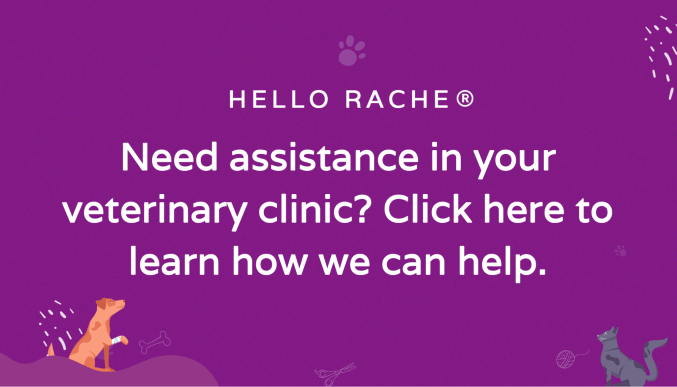
How do you become a veterinary assistant?
If someone wants to work as a veterinary assistant, they'll need a high school diploma or equivalent.
Some employers expect their veterinary assistants to be certified. For example, they can complete training and pass an exam by the National Association of Veterinary Technicians in America (NAVTA). There are also associate’s degrees available.
When starting a new job, these workers usually undergo a brief on-the-job training program. A qualified veterinarian should supervise this training.
To be successful in this fast-paced role, experience with animals is recommended.
There are long-term opportunities for veterinary assistants. With further training, they can become veterinary nurses or veterinary surgeons.
What is a virtual veterinary assistant?
If you need support in your veterinary office, a virtual assistant could be the right choice. While remote workers can't help with physical tasks, such as caring for animals, they can still reduce your workload.
Trained veterinary health care virtual assistants can perform a range of office duties. For example, they can answer phone calls, respond to emails, write reports, create presentations, and input data.
You can communicate with your assistant via video chat or email, and you can always use the same person. Over time, they'll learn about your unique processes, and the right virtual assistant will be someone you can rely on.
Whether your administrative team needs short-term or long-term support, a virtual worker is an option worth considering. When you outsource your administrative tasks, it can free up the rest of your team for in-person support.
What does a veterinary assistant do?
Are you considering hiring a veterinary assistant? Let's take an in-depth look at some of their top job duties.
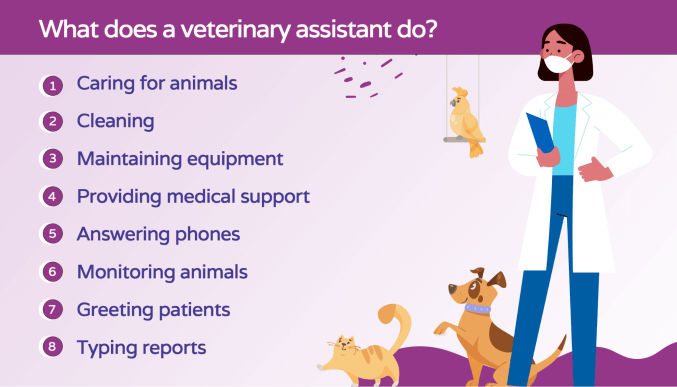
1. Caring for animals
Veterinary assistants care for animals. They take care of routine tasks, such as feeding, bathing, and exercising patients. Some animals may have specific dietary requirements and medications.
Grooming can include cutting nails and brushing and cutting fur. During this process, workers can treat various skin conditions and infections. For example, they may treat lice and mites.
The veterinary assistant prepares animals for examination and gets them ready for surgical procedures. Areas of the skin may need to be shaved before an operation.
The veterinary surgeon will check that the animal is fit enough to go through the procedure. Their assistant will support them with these diagnostic tests.
Some animals that have been neglected require additional attention. Veterinary assistants need to be confident and patient to provide this care.
2. Cleaning the workspace
It's no secret that animals can be messy. They can have soiling accidents, lose fur, and carry dirt.
In a veterinary clinic, it's important that the workspace is maintained and hygiene is a priority. You'll be seeing multiple animals every day, and keeping them safe from contaminated services will guarantee you provide the best care.
Daily tasks for the veterinary assistant may include cleaning cages, wiping benches, and sweeping floors.
Besides cleaning up after animals, these assistants need to keep the reception area tidy. If there’s downtime, they may be asked to wash dishes and do other general cleaning tasks.
3. Maintaining equipment
Veterinarians use a range of equipment. For example, there'll be surgical equipment for operations. Plus, there are tools for grooming and diagnostic instruments.
The veterinarian assistant will be responsible for maintaining these tools. They’ll clean and sterilize instruments and check for any faults.
If their role involves office duties, they may be responsible for changing printer cartridges and keeping the photocopier filled with paper.
Some veterinarian assistants need to restock and order supplies. For example, there could be syringes, gauze, and treats that need to be well-stocked. Reusable items such as towels and blankets need to be washed, dried, and folded.
4. Providing medical support
As an assistant to the veterinary team, these workers provide medical support. They may be present during lab procedures and help during scheduled appointments.
Veterinary assistants may administer medication and offer treats to animals as a reward for taking medication or having a shot. They can collect and label samples and send them for testing.
Veterinary assistants will have training in first aid, and they may use these skills on the job.
Plus, they can do administrative tasks during appointments. They can use their medical knowledge to write reports and update patient information.
Every animal is different, and the type of medical support required can vary between appointments. Some larger animals will require multiple team members to lift and care for them.
5. Answering phones
Veterinary assistants may be asked to help with receptionist duties and other administrative tasks.
The role may involve sitting behind the receptionist's desk and speaking to pet owners when they arrive.
A good veterinary assistant will be confident in taking phone calls. They'll book and confirm appointments, answer queries, and take messages. They’ll try to answer the phone quickly and clearly, and introduce the company.
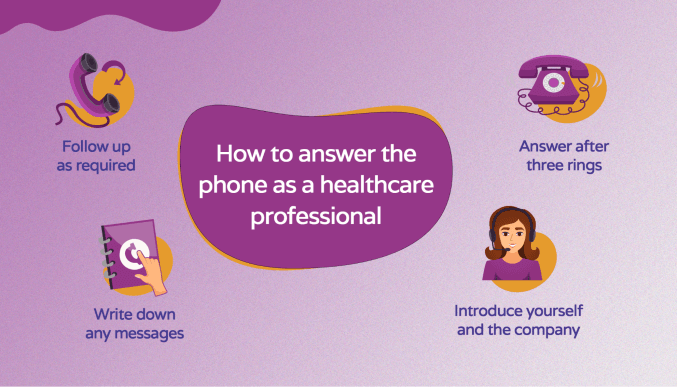
Filing documents, responding to emails, and processing payments can all be part of the veterinary assistant’s job description.
6. Monitoring animals
Animals require care after surgery or other treatments. The veterinary assistant will watch them to ensure they recover as expected.
They’ll check the animals for signs of infection and report anything unusual to the veterinary surgeon.
When pets wake up from surgery, they can be distressed. The surroundings can be unfamiliar, and their behavior may change. The veterinary assistant can keep them company and make sure they're comfortable.
Sometimes, stray animals will be left at the clinic. The veterinary assistant will care for them until the owner can be located.
7. Greeting patients
Depending on the workplace, the veterinary assistant may be the first person pet owners and their animals see.
When people arrive at your clinic, first impressions matter. They should be greeted by someone who's friendly and ready to answer questions. Remember, pet owners can be emotional, and a calm, supportive face can help them relax.
The veterinary assistant will be able to serve people quickly and efficiently. Processing payments and re-booking appointments may also be part of the job. For example, pets may need multiple appointments to stay up to date with their vaccinations.
8. Typing reports
Typing reports can be time-consuming, but your veterinary assistant can lessen the load. During the appointment, they may be asked to take notes or enter data into a computer program.
These workers will have computer skills and will learn how to use patient software. They'll use their medical knowledge to transcribe the information accurately.
Each animal will have their own file with details of their owner, conditions, and immunizations.
Sometimes, the veterinary assistant may be asked to write and post letters or send emails to pet owners. For example, the veterinary assistant may prepare the notification when a pet is due for a follow-up appointment.
What are the top veterinary assistant skills?
Want to hire a veterinary assistant? These are the top skills and attributes you should look for.
1. Communication skills
The role of the veterinary assistant is a social one. It’s a team environment, and these workers need to work closely with other staff members, including veterinary technicians and surgeons.
Excellent communication skills are essential. Look for someone with confidence, verbal communication, listening skills, customer service, empathy, and written communication skills.

Pet owners can feel nervous about the health of their furry friends. The veterinary assistant needs good customer skills to put them at ease.
Active listening skills are also important. They may collect patient information for the senior team and should be able to relay it accurately. Plus, they should understand medical terminology and jargon.
2. Problem-solving skills
A day in the life of a veterinary assistant can vary. Animals can have a range of health conditions, and some may have been in an accident. Those working in animal emergency centers can be met with complicated cases.
Problem-solving and critical thinking skills are essential for this role. The entire veterinary team needs to find solutions in different situations.
How? Problem-solving is about finding a problem, considering different ways to solve it, and implementing the best solution.
Staff need to think quickly on the go and deliver quality care for every animal.
3. Empathy and compassion
Animals can be beloved pets and often become part of the family. Whether it's a dog, a rabbit, or a snake, people adore their animals. When they're sick or injured, it can be a stressful time for their owners.
It's understandable people can feel emotional, especially if they have to say goodbye to their pets. Plus, surgery can be costly and high risk making it a difficult choice for some pet owners.
Veterinary assistants need to be empathetic and compassionate. They need to be kind to humans and their pets and try to put them at ease.
4. Manual dexterity
The next skills to look out for are manual dexterity and physical strength. Dealing with animals can be physically demanding, and the job can involve long hours in a standing position.
Animals may have to be lifted or turned during surgery. Veterinary assistants also need to hold small instruments and keep them steady for veterinary surgeons.
If animal grooming is required, pets can be restless or playful. Good manual dexterity is essential for clipping nails, brushing fur, and washing animals.
5. Detail-oriented
Attention to detail is a skill all health professionals need. Those working in veterinary clinics and animal hospitals have to give high-quality care. They need to provide the right medical treatments and try to minimize errors.
People who are detail-oriented are focused and pride themselves on going the extra mile. They double-check their work and concentrate on even the smallest tasks.
Veterinary assistants can support senior team members with medications and treatments. They need to make sure the dosages are correct, and medications are taken at the right times.
It's not just those on treatment plans that benefit from staff with great attention to detail. Veterinary assistants write reports and record patient information, and this also needs to be accurate.
6. Positive attitude
Any job working with animals can be fast-paced. Some days can be stressful, and it can be difficult when pet owners lose their animals.
Veterinary assistants need to have a positive attitude. They should be genuinely passionate about the role and enjoy going to work each day.
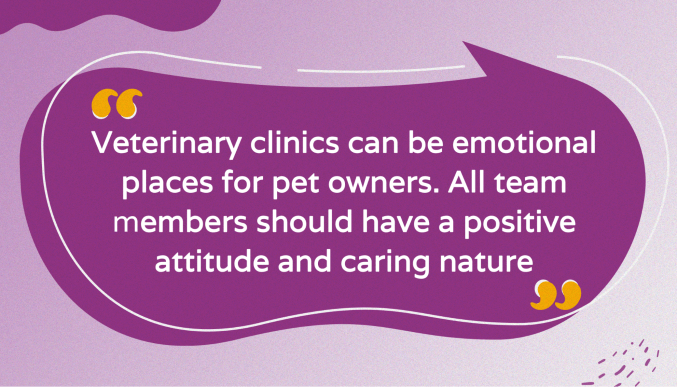
The way your staff treats pet owners and their animal friends can have an impact on your business. Customers often choose animal care services through word of mouth, and compassionate team members will leave a good impression.
Positive veterinary assistants can make a hard day a little bit easier for pet owners.
7. A love of animals
This job is all about animal health care and wellbeing. Any veterinary assistant should be interested in working with animals.
They should genuinely love animals and understand how to care for them. Most people who get into this role have experience with animals. For example, they may have grown up on a farm, volunteered at an animal shelter, or had pets at home.
Veterinary assistants have to be patient and caring for all animals, and they can't choose favorites. They should give the same care to every animal regardless of their type, personality, and breed.
As someone who works in a veterinary clinic, you'll understand how important a love of animals is for anyone you hire.
8. Calm under pressure
Veterinary assistants should be cool and calm under pressure. There can be emergency situations, and on some shifts, there will be multiple animals that require surgery.
There can be blood and excrement, and animals can be distressed. In these moments, the veterinary assistant will need to be there to support the veterinarian. They’ll need to follow instructions and think with a clear head.
Juggling patients while keeping pet owners happy and the workspace tidy can be a challenge.
If you’re looking for a veterinary assistant, try to find someone who has experience working in a fast-paced work environment.
How much does a veterinary assistant make?
The average salary for a veterinary assistant is $29,780 per year or $14.32 per hour.
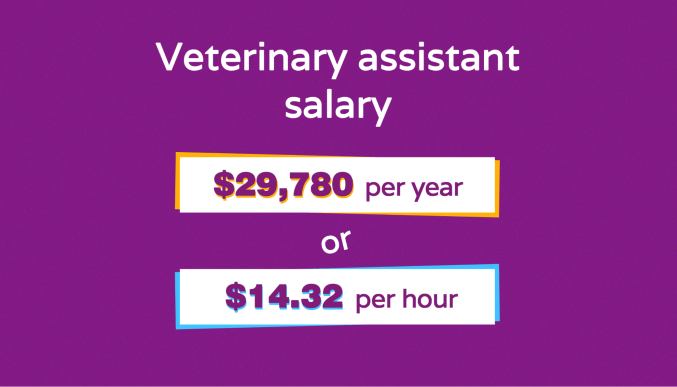
The salary can vary depending on the workplace and experience. For example, if it’s an entry-level position, the average salary is $22,920 per year. Top earners can make over $38,860 per year.
The highest-paying industry is research and development, followed by education and veterinary services.
Consider a veterinary healthcare virtual assistant if you’re looking for an affordable alternative for administrative support when you need it.
Our trained and certified remote workers come at the cost of just $9.90 per hour. This is a flat rate, with no overtime. You won’t need to worry about contracts or sick pay. Get in touch with Hello Rache today.
Hiring a veterinary assistant
If you run a veterinary clinic, you may be looking for extra support. A veterinary assistant can help you with a range of duties. Some of the tasks include caring for animals, keeping the workspace clean and tidy, and maintaining equipment.
Veterinary assistants provide medical support, answer phones, and monitor animals. They greet patients and type reports.
Not everyone is suited to this role. The person you choose should have good communication skills, problem-solving skills, empathy, and compassion.
It’s a physically demanding job, so they’ll need strength and manual dexterity. A positive attitude and love of animals is a must. Plus, they should be detail-oriented and cool and calm under pressure.
If you don’t need in-person support, a remote team member could be an affordable alternative.
Learn more about our services or check out our blog for more articles like this one.



